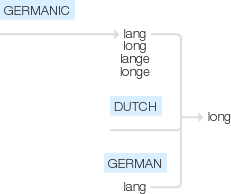Long
Old English lang, long (adjective), lange, longe (adverb), of Germanic origin; related to Dutch and German lang .
wiktionary
From Middle English long, lang, from Old English long, lang(“long, tall, lasting”), from Proto-West Germanic *lang, from Proto-Germanic *langaz(“long”), from Proto-Indo-European *dlongʰos(“long”). Cognate with Scots lang(“long”), North Frisian long, lung(“long”), Saterland Frisian loang(“long”), Norwegian, West Frisian, Dutch and German lang(“long”), Swedish lång(“long”), Icelandic langur(“long”), Galician longo(“long”), Spanish luengo(“long”), Latin longus(“long”), Russian дли́нный(dlínnyj). Not a loan from French long, which is an inherited cognate from the exact same form. Doublet of lungo.
From Middle English longe, lange, from Old English longe, lange, from the adjective (see above).
From Middle English longen, from Old English langian(“to long for, yearn after, grieve for, be pained, lengthen, grow longer, summon, belong”), from Proto-Germanic *langōną(“to desire, long for”), from Proto-Indo-European *lengʷʰ-(“to be easy, be quick, jump, move around, vary”). Cognate with German langen(“to reach, be sufficient”), Swedish langa(“to push, pass by hand”), Icelandic langa(“to want, desire”), Dutch, German verlangen(“to desire, want, long for”).
From Middle English long, lang, an aphetic form of Middle English ilong, ylong, from Old English ġelong, ġelang(“along, belonging, depending, consequent”); the verb later reinterpreted as an aphetic form of belong.
Shortening of longitude
From Middle English longen, from Old English langian(“to belong, pertain”), from Old English *lang, which is of uncertain origin yet related to Old English ġelang(“dependent, attainable, present, belonging, consequent”), Old Saxon gilang(“ready, available”).
etymonline
long (adj.)
Old English lang "having a great linear extent, that extends considerably from end to end; tall; lasting," from Proto-Germanic *langa- (source also of Old Frisian and Old Saxon lang, Old High German and German lang, Old Norse langr, Middle Dutch lanc, Dutch lang, Gothic laggs "long").
The Germanic words perhaps are from PIE *dlonghos- (source also of Latin longus "long, extended; further; of long duration; distant, remote," Old Persian darga-, Persian dirang, Sanskrit dirghah "long"), from root *del- (1) "long" (source also of Greek dolikhos "long," endelekhes "perpetual"). Latin longus (source of prolong, elongate, longitude, etc.) thus is probably cognate with, but not the source of, the Germanic words. The word illustrates the Old English tendency for short "a" to become short "o" before -n- (also retained in bond/band and West Midlands dialectal lond from land and hond from hand).
Also in Old English in reference to time, "drawn out in duration," with overtones of "serious." The old sense of "tall" now appears to be dialectal only, or obsolete. For long "during a long time" is from c. 1300. To be long on something, "have a lot" of it, is from 1900, American English slang. A long vowel (c. 1000) originally was pronounced for an extended time. Mathematical long division is from 1808. Sporting long ball is from 1744, originally in cricket. Long jump as a sporting event is attested from 1864. A long face, one drawn downward in expression of sadness or solemnity, is from 1786. Long in the tooth (1841 of persons) is from horses showing age by recession of gums (but not in this sense until 1870). Long knives, name Native Americans gave to white settlers (originally in Virginia/Kentucky) is from 1774, perhaps a reference to their swords. Long time no see, supposedly imitative of American Indian speech, is first recorded 1919 as Chinese English.
long (v.)
Middle English longen, from Old English langian "to yearn after, grieve for," literally "to grow long, lengthen," from Proto-Germanic *langojan, which probably is connected with the root of long (adj.). Cognate with Old Norse langa, Old Saxon langon, Middle Dutch langhen, Old High German langen "to long," German verlangen "to desire." Related: Longed; longing.
long (adv.)
Old English lange, longe "for a length of time, a long time; far, to a great extent in space," from long (adj.). Old English also had langlice (adv.) "for a long time, long, at length." Longly (adv.) is rarely used. No longer "not as formerly" is from c. 1300; to be not long for this world "soon to die" is from 1714.
long (n.)
in long and short of it "the sum of the matter in a few words," c. 1500, from long (adj.).
